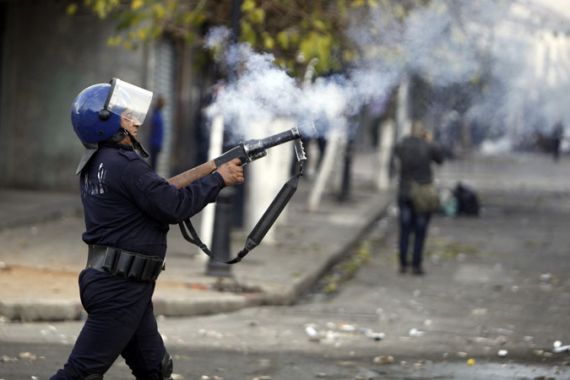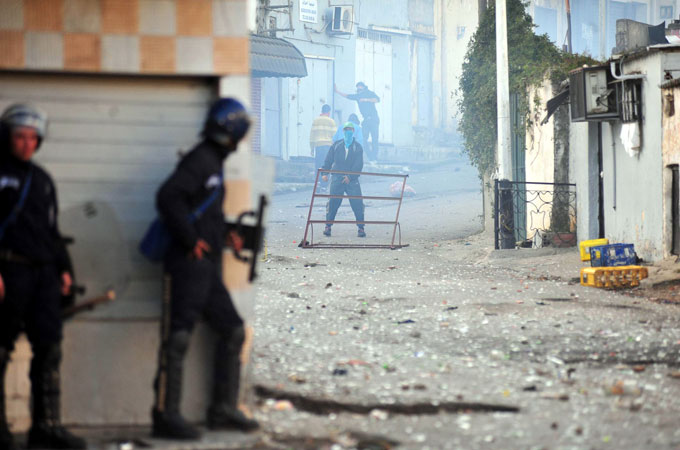Algeria unrest turns deadly
Three people confirmed killed and hundreds injured as ministers meet to discuss ways of halting crisis.

 |
| Most of the people injured in the protests are reportedly from the security services [EPA] |
Three people have been killed and hundreds injured in continuing protests in Algeria, as the government meets to discuss ways of halting the rising food costs and unemployment that have sparked the unrest.
At least 300 of the 400 people injured in the riots were police officers, Dahou Oul Kablia, Algeria’s interior minister, said on national radio on Saturday.
One of the three people killed was named as 18-year-old Azzedine Lebza. He was shot dead in Ain Lahdjel in the M’Sila region, 300km from Algiers, the capital.
“He died in an attempt to break into a police station,” Kablia said.
A second demonstrator was killed on Friday in Bou Smail, a small town 50km west of Algiers, he said.
“He was picked up in the street, wounded. A pathologist said he had died from wounds to the head, but the cause of death has not yet been established.”
A medical official said earlier that the man, identified in media reports as 32-year-old Akriche Abdelfattah, had been hit in the face by a tear gas canister.
The third body was found in a hotel burned down by rioters, the interior minister said.
Growing unrest
Algeria has seen three days of unrest over the rising costs of living and unemployment, which government figures show standing at about 10 per cent, but which independent organisations put closer to 25 per cent.
Algiers, which has seen protests in recent days, was calmer on Saturday, but witnesses reported fresh protests in the Kabylie region.
|
Al Jazeera’s Hashem Ahelbarra reports |
Ministers were due to meet to discuss measures to limit the profit margins traders can charge for staple foods.
Mustapha Benbada, Algeria’s trade minister, has said urgent measures will be taken to alleviate pressure on the population.
“From the start of next week, the situation will get better,” Benbada was quoted as saying by state radio.
The government is expected to impose fixed profit margins on widely-consumed goods including edible oil and sugar.
But Dalila Hanache, an Algerian journalist with the news website Echorouk, said that the protests went beyond just rising prices.
“I hear young people in the neighbourhood who say these clashes and protests are not the result of high food prices only, they think there are lots of problems in this country – educational, problems in the health sectors, in all sectors of government,” she told Al Jazeera.
Mohamed Ben Madani, editor of The Maghreb Review, said the situation was “out of control” and that the protests could continue for weeks.
“The government simply ignored the people since they were elected to office and basically now they [the people] have come out into the streets asking the authorities to give them jobs and to share the wealth of the nation,” he told Al Jazeera, from London.
“I’m afraid the authorities will more [likely] crack down on those who are protesting against them rather than giving them what they are asking for. The minister this afternoon labelled them as ‘criminals’.”
‘Probably a revolution’
Mohamed Zitout, a former Algerian diplomat, told Al Jazeera: “It is a revolt, and probably a revolution, of an oppressed people who have, for 50 years, been waiting for housing, employment, and a proper and decent life in a very rich country.
“But unfortunately it is ruled by a very rich elite that does not care about what is happening in the country – because they did not give people what they want, even though the government has the means to do so, the people are now revolting.”
Young people clashed with police in Algiers and several other towns across the country on Friday despite appeals for calm from imams.
In Annaba, 600km west of the capital, rioting broke out after Friday prayers in a poor neighbourhood of the city and continued late into the night. A local government office was ransacked, according to witnesses.
Protesters also cut down electricity poles during the night, cutting off power to the working class suburb of Auzas.
In Tizi Ouzou, the capital of the eastern Kabylie region, residents said rioting had spread from the city centre to the outskirts, and demonstrators burning tyres blocked the main road to Algiers.
Abdelaziz Bouteflika, Algeria’s president, who is serving his third term, has not made any public comment on the protests.